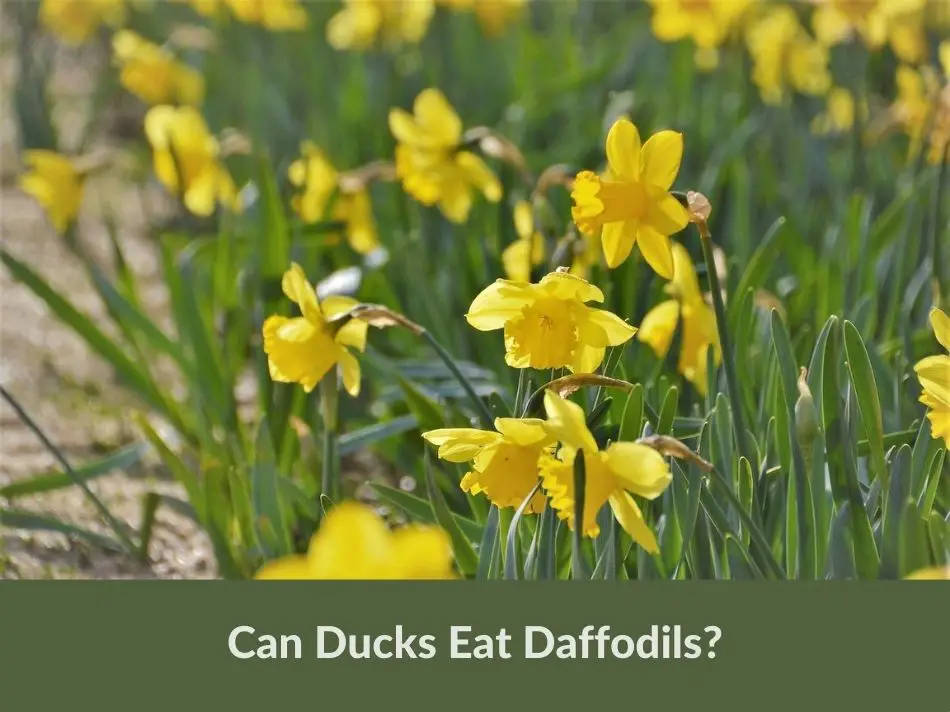Ducks, with their adorable waddles and insatiable appetites, often elicit smiles from young and old alike. They are omnivores, meaning they eat both plants and animals. But, can ducks eat daffodils?
No, daffodils contains a compound called lycorine, among other alkaloids. These compunds are toxic ducks. Eating daffodils can lead to vomiting, stomach pain and diarrhea.
In this article, we explore the intriguing yet potentially dangerous question of whether ducks can eat daffodils. We will take a deep dive into the science behind daffodil toxicity, the risks involved, real-world cases, and safer dietary alternatives for ducks.
What Are Daffodils?
Daffodils, known by the scientific name Narcissus, are a spring-flowering perennial that comes in various forms and colors. While they are charming to look at and a popular choice in many gardens, daffodils contain a compound called lycorine, among other alkaloids.
These compounds are toxic, primarily affecting the gastrointestinal system and, in severe cases, other systems like the nervous system.
How Toxicity Works
Lycorine causes gastrointestinal irritation, leading to symptoms such as vomiting, diarrhea, and abdominal pain. Although these symptoms are most commonly observed in dogs and cats, ducks and other animals are also susceptible.
Ducks, however, tend to be hardy creatures, and it might require a larger dose to manifest obvious symptoms. This factor could lead some owners to believe that daffodils are harmless, but that would be a mistake.
What to Do If Your Duck Eats a Daffodil
- Immediate Isolation: Separate the affected duck from the rest of the flock to prevent others from ingesting the daffodil.
- Consult a Veterinarian: Contact your vet as soon as possible to describe the situation and ask for advice. Depending on the severity, they may ask you to bring the duck in for treatment.
- Activated Charcoal: Some veterinarians recommend administering activated charcoal to absorb the toxins, but consult your vet before attempting any treatment.
- Hydration and Supportive Care: Keeping the duck hydrated is crucial, as dehydration can exacerbate symptoms.
- Close Monitoring: Keep a close eye for any changes in behavior, and consult your veterinarian for any follow-up care.
Observational Risks
While many ducks may steer clear of plants they instinctively sense are dangerous, others might not be so discerning, especially young ducks or ducks new to a habitat. Ducks can be inquisitive eaters, and their constant foraging may inadvertently lead them to sample a daffodil.
Why Ducks Might Be Tempted
Daffodils often sprout near ponds or wetlands, a natural habitat for ducks. The plants’ bright colors could attract the ducks, and if food sources are scarce, a daffodil might look increasingly tempting.
Real-World Cases and Studies
Though comprehensive studies on ducks and daffodil toxicity are limited, various avian studies demonstrate the risks of plant alkaloids. Plus, there are anecdotal reports from duck owners who noticed mild to severe symptoms after their ducks ingested parts of the daffodil plant. The reported signs usually included lethargy, disorientation, and digestive upset. Therefore, it’s safe to err on the side of caution.
Other Flowers Ducks Can Eat
While daffodils are off the menu for ducks due to their toxicity, there are several other flowers that can safely be included in a duck’s diet. These flowers are not only a colorful addition to their meals but also provide a variety of nutrients.
Remember to view our complete list of duck-friendly flowers and plants.
Conclusion
Daffodils and ducks may share a habitat, but these two should never share a meal. While the sight of ducks foraging in a field full of flowers may seem idyllic, the reality could be far more severe due to the toxic compounds found in daffodils. By being aware of the risks and taking preventative measures, you can ensure that your ducks live a safe, healthy, and happy life.
Disclaimer: The information in this article is for informational purposes only. I'm not an expert or a veterinarian.


